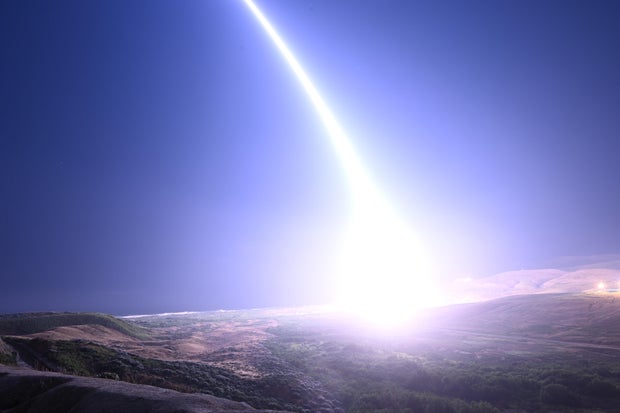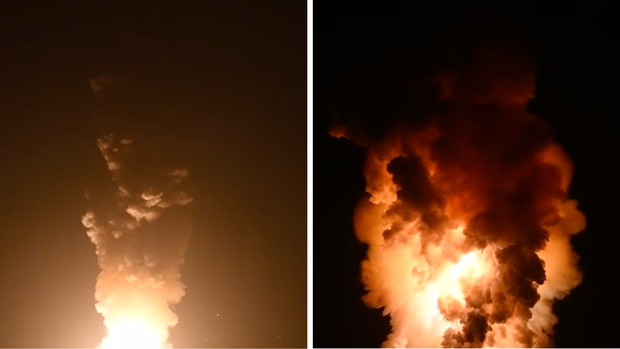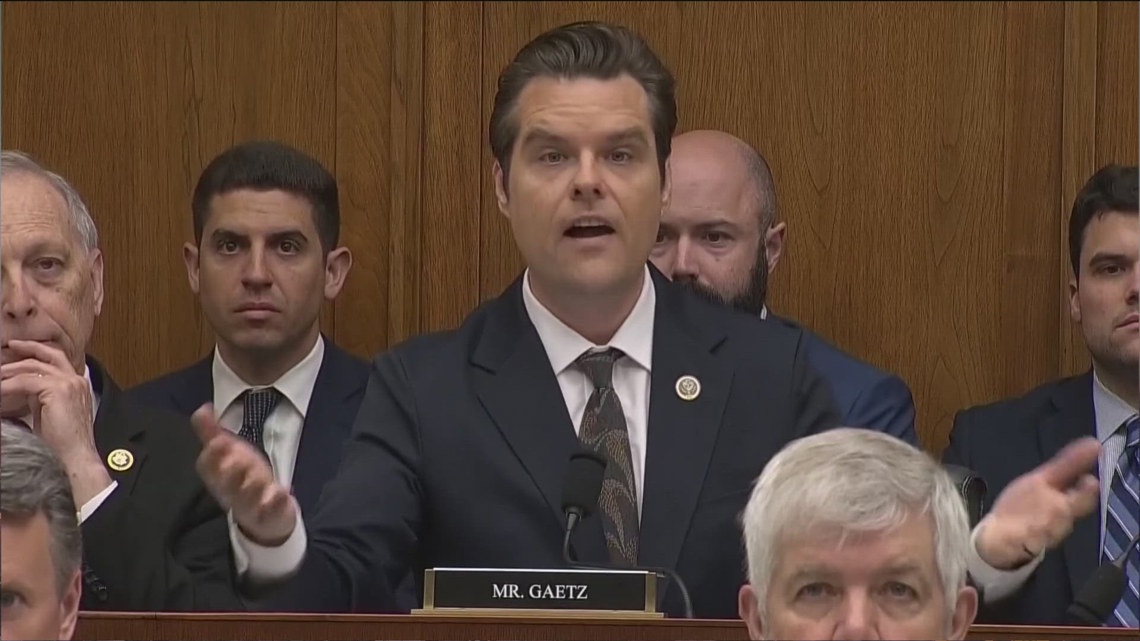CBS News
Video and images show intercontinental ballistic missile test launched from California

The United States launched an unarmed intercontinental ballistic missile from the Vandenberg Space Force Base in California early Tuesday morning — the first of two test launches scheduled for this week. The Air Force Global Strike Command shared video and images of the missile, Minuteman III, as it rocketed up and left a burning trail of smoke and flames through the sky north of Santa Barbara.
The test at 12:56 a.m. PT was carried out by a joint team of airmen from the Air Force Global Strike Command, a branch of the U.S. Air Force responsible for nuclear deterrence, and was supported by Space Force guardians, the command said in an announcement. The announcement noted that the test launch program is designed “to validate and verify the safety, security, effectiveness, and readiness of the weapon system.” The Minuteman III was launched with a reentry vehicle.
U.S. Space Force photo by Airman 1st Class Olga Houtsma
“This test launch marks the start of a remarkable week for our Guardians and Airmen at Vandenberg, with two test launches scheduled from the Western Range,” said Col. Bryan Titus, vice commander of the Space Launch Delta 30 military unit, which manages space launch operations on the West Coast, in a statement. “These tests hold immense significance, not only for our nation’s defense, but also serve as a pivotal moment in showcasing the exceptional capabilities and expertise of our dedicated team.”
An announcement by the public affairs team for Space Launch Delta 30 reiterated that it is routine to test launch unarmed intercontinental ballistic missiles like Minuteman III, a model that first became operational in the 1970s, according to the Air Force Nuclear Weapons Center. There are currently 400 Minuteman III missiles at various Air Force bases across the country, which the military wing describes as a strategic weapons system meant to serve as a “reliable and effective nuclear deterrent.”
U.S. Space Force video by Senior Airman Kadielle Shaw
Similar tests have been carried out more than 300 times before, said Space Launch Delta 30, adding that they are “not the result of current world events” but instead intend “to demonstrate that the United States’ nuclear deterrent is safe, secure, reliable and effective to deter 21st century threats and reassure our allies.”
Normally, test flights for the Minuteman III out of Vandenberg end with the missile’s reentry vehicle traveling more than 4,000 miles across the Pacific Ocean, from coastal California to Kwajalein Atoll in the Marshall Islands. During another routine test launch last November, a Minuteman III missile launched from the same base was intentionally destroyed over the Pacific because of “an anomaly,” the Air Force Global Strike Command said in a statement at the time.
“An anomaly is any unexpected event during the test,” the command said in that statement. “Since anomalies may arise from many factors relating to the operational platform itself, or the test equipment, careful analysis is needed to identify the cause.”
CBS News
U.S. received Iran’s written assurance it was not actively trying to assassinate Trump

The U.S. received written assurance from Iran before the presidential election that its leadership was not actively trying to assassinate President-elect Donald Trump, CBS News confirmed, according to a source with direct knowledge of the correspondence. The message arrived after the White House in September affirmed that killing a former U.S. president or former U.S. official would be seen by the Biden administration as an act of war.
“We consider this a national and homeland security matter of the highest priority, and we strongly condemn Iran for these brazen threats,” National Security Council spokesman Sean Savett said in a statement in September.
Iran said in its message, which was conveyed by a third party, that it understood this premise. The Wall Street Journal first reported Iran’s message to the U.S.
The Justice Department is currently prosecuting at least two individuals alleged to have been part of murder-for-hire plots to kill Trump while he was still a candidate. One operative working for Iran’s Islamic Revolutionary Guard Corps told federal investigators that he was tasked in September with “surveilling, and, ultimately, assassinating” Trump, according to court records unsealed last week.
Prosecutors said Farhad Shakeri, who is believed to be residing in Iran, told investigators in a phone interview that unnamed IRGC officials pushed him to plan an attack against Trump to take place in October. If the plan could not come together in time, the Iranian officials directed Shakeri to delay the plot until after the election because the official “assessed that [Trump] would lose the election,” the charging documents said.
In early August, a Pakistani national with alleged ties to Iran was arrested and charged with plotting a murder-for-hire scheme targeting U.S. government officials and politicians, according to charging documents unsealed Tuesday.
A U.S. official pointed out that Iran did not task its most effective proxy force, Hezbollah, with carrying out these plots. This official described Iran’s approach to date as “nice if it works. If it doesn’t, then it’s not a problem.”
In response to inquiries suggesting that “Iran told U.S. it wouldn’t try to kill Trump”, the Permanent Mission of the Islamic Republic of Iran said it would not comment on official messages between two countries.
The mission said in a statement, “The Islamic Republic of Iran has long declared its commitment to pursuing Martyr Soleimani’s assassination through legal and judicial avenues, while adhering fully to the recognized principles of international law.”
Trump has raised the ire of Iranians for a few reasons. He exited the international Iran nuclear agreement, which had lifted some sanctions in exchange for restrictions on Iran’s nuclear program. He also directed the 2020 airstrike that killed top Iranian commander Gen. Qasem Soleimani. Since then, some Trump administration officials and military officials received threats from the regime, among them, Robert O’Brien, who was national security adviser during the strike. His predecessor in the job, John Bolton, who was part of the maximum pressure campaign that exerted sanctions pressure on Tehran, has also received threats.
In 2022, the U.S. intelligence community assessed that Iran would threaten Americans — both directly and via proxy attacks — and was committed to developing networks inside the U.S. Two persistent threat assessments submitted to Congress by the State Department in January 2022 cited a “serious and credible threat” to the lives of former Secretary of State Mike Pompeo and former Trump administration Iran envoy Brian Hook. The non-public assessments showed that throughout 2021 and again in 2022, the State Department determined that round-the-clock, U.S.-taxpayer-funded diplomatic security details were needed to protect both men. That continues today.
Multiple former officials have spoken to CBS about duty-to-warn notices that they have recently received from the FBI and other agencies regarding the ongoing threat from Iran and Iranian-hired actors, implying the U.S. is taking the threat seriously and not taking the Iranian regime’s assurances at face value.
contributed to this report.
CBS News
National security implications of Trump’s Cabinet picks

Watch CBS News
Be the first to know
Get browser notifications for breaking news, live events, and exclusive reporting.
CBS News
Doctor explains how RFK Jr.’s plans could affect Americans’ health

Watch CBS News
Be the first to know
Get browser notifications for breaking news, live events, and exclusive reporting.












